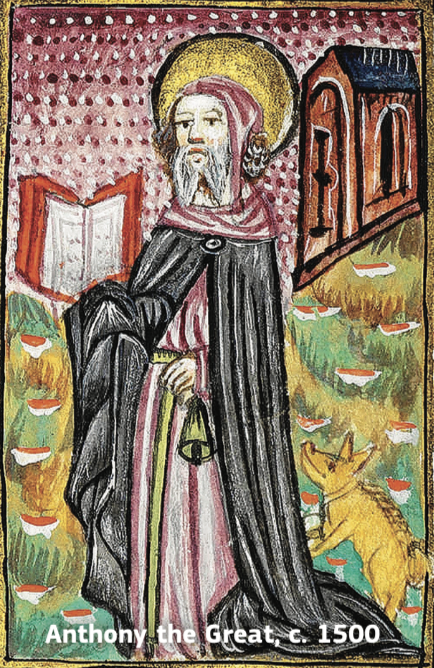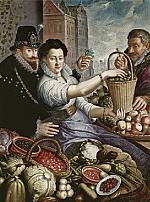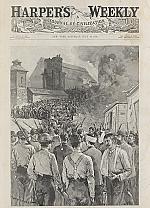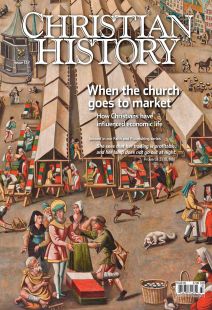Christian History timeline: Market matters

[Saint Anthony—van Reynegom Book of Hours, King Baudouin Foundation, photo: Philippe de Formanoir / [public domain] Wikimedia]
— c. 50-120 The Didache gives instructions on how the church should organize itself, including its money.
— c. 180 Irenaeus writes in Against Heresies that Christians
are not bound by Old Testament rules on tithing but should give everything freely.
— c. 180-202 Clement of Alexandria preaches “The Rich Young Ruler.”
— c. 251 Cyprian attributes the falling away of believers to their desire to gather wealth in On the Lapsed.
— 258 Lawrence, deacon in Rome, distributes church property to the needy rather than turn it over to Roman persecutors and presents the poor to his tormenters as “the treasures of the church.”
— c. 270 Anthony the Great is persuaded by Matthew 19:21 to give away his property and go into the Egyptian desert as a hermit.
— 325 The Council of Nicaea forbids clergy from charging interest on loans.
— c. 386-397 John Chrysostom preaches Homily 56 against moneylenders.
— c. 516 Benedict of Nursia writes his Rule to regulate the life of his monks, including their economic life.
— 800 Charlemagne outlaws loaning money at interest in his empire.
— 1139 The Second Lateran Council denies a Christian burial to professional lenders.
— 1150 The Templar order begins issuing letters of credit to pilgrims on the Crusades.
— 1199 Pope Innocent III taxes the clergy of Europe to fund the Crusades.
— 1209 Francis of Assisi founds the Franciscans with the explicit instruction that they should not own property.
— 1215 Pope Innocent III orders that the princes of Europe must consult him before taxing the clergy.
— 1216 The Dominicans are founded as a mendicant order.
— c. 1265-1274 Thomas Aquinas condemns usury and discusses a just price in the Summa Theologica.
— 1294 The medieval economy experiences a “credit crunch.”
— 1296 Pope Boniface VIII issues Clericis laicos, exempting the clergy from paying taxes to any secular ruler.
— 1311 The Council of Vienne decrees that the usurer is to be “punished as if a heretic.”
— c. 1317 Dante puts usurers in the seventh circle of hell in his Inferno.
— 1361 London bishop Michael Northburgh establishes a charitable bank that makes zero-interest loans to the poor.
— 1462 The Franciscans found the first Montes Pietatis (a pawnshop providing interest-free loans) in Italy.
— c. 1488 Erasmus writes The Despising of Riches.
— c. 1500-1600 The School of Salamanca (Spanish theologians and economic theorists) lays the foundation for modern price theory.
— 1524 Martin Luther publishes the sermon “On Trading and Usury.”
— 1738 Benjamin Lay protests slavery in the Philadelphia Yearly Meeting.
— 1759 Josiah Wedgwood opens his factory.
— 1760 John Wesley publishes the sermon “The Use of Money.”
— 1763 Abolitionist Quaker John Woolman publishes A Plea for the Poor.
— 1774 Shakers arrive in America.
— 1776 Adam Smith pulishes The Wealth of Nations.
— 1808 North Carolina Quakers establish a committee to care for and in some cases resettle enslaved people whose Quaker owners wish to free them.
— c. 1820s Shakers develop a form of mass production to standardize furniture throughout their settlements.
— 1872 Friedrich Wilhelm Raiffeisen creates a precursor to modern credit unions.
— 1881 Booker T. Washington founds the Tuskegee Institute.
— 1890 Russell Conwell publishes his popular lecture “Acres of Diamonds,” which he will deliver over 6,000 times in his life.
— 1891 Pope Leo XIII releases the encyclical Rerum novarum, the foundation of modern Catholic Social Teaching.
— 1896 Charles Sheldon publishes In His Steps.
— 1897 The Salvation Army in Australia founds Hamodava Coffee Company, which attempts to pay coffee growers a fair price for their crops.
— 1901 Theologian Abraham Kuyper, who will influence the modern faith and work movement, is elected prime minister of the Netherlands.
— 1902 Annie Turnbo Malone, a pioneer of multilevel marketing, opens her first store.
— 1905 Max Weber publishes The Protestant Ethic and the Spirit of Capitalism.
— 1907 Walter Rauschenbusch publishes Christianity and the Social Crisis.
— 1919 R. G. LeTourneau commits himself to be a businessman for God.
— 1922 James Hensey publishes Storehouse Tithing.
— 1925 Bruce Barton publishes The Man Nobody Knows on Jesus as the founder of modern business.
— 1931 Pope Pius XI releases Quadragesimo anno.
— 1946 Edna Ruth Byler begins the modern free trade movement.
— 1949 The Church of the Brethren founds SERRV to sell South American handicrafts in the United States.
— 1952 Elton Trueblood publishes Your Other Vocation on the ministry of the laity.
— 1955 Sam Shoemaker launches the “Pittsburgh Experiment”; the next year he founds the magazine Faith at Work.
— 1961 Pope John XXIII releases Mater et magistra.
— 1991 Pope John Paul II releases Centesimus annus.
By The editors
[Christian History originally published this article in Christian History Issue #137 in 2020]
Next articles
Bringing profit to neighbors
The church and economic theories from zero-sum to mutual benefit
Jordan J. BallorAvoiding shipwrecks
Catholic papal encyclicals recommended a middle way on economic issues
Kevin SchmiesingSupport us
Christian History Institute (CHI) is a non-profit Pennsylvania corporation founded in 1982. Your donations support the continuation of this ministry
Donate





